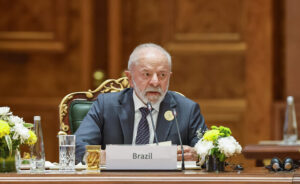
Published 28/03/2025 08:52 | Edited 28/03/2025 15:37
An exchange of messages between senior US government officials revealed how US imperialism articulates wars of aggression with geopolitical and economic goals. The leak exposed that the air strike held on March 15 against the capital of Yemen, Sanaã, which left at least 53 dead, was planned outside the official channels and without support in imminent threat, contrary to international law.
The information came to light after journalist Jeffrey Goldberg, editor of the magazine The Atlanticbe added by mistake to a group of messages in the Signal application. The group brought together names such as Vice President JD Vance, Secretary of Defense Pete Hegseth, National Security Advisor Michael Waltz and other Trump high-ranking members.
Goldberg followed in real time the planning of the attack and confirmed his authenticity after the bombing.
The records show that the operation was conceived as an action of “restoration of dissuasion” and reaffirmation of the US global power. In one of the messages, Hegseth states that the bombardment “was not about the Houthis,” but about the control of trade routes in the Red Sea and the response to statements against Israel.
“That [não é] About the hethis. I see this as two things: 1) restore freedom of navigation, a central national interest; and 2) re -establish the deterrent, which Biden destroyed, ”said the Secretary of Defense.
The episode exposes direct violations of the UN letter, which prohibits the use of force without permission of the Security Council or proven self -defense, and the principles of Geneva Conventions, when reaching civilians and political leaders not involved in combat.
Internally, it also raises questions about the legality of unofficial applications to address military operations, which may configure infringement to the law of federal records and the espionage law, according to experts heard by itself The Atlantic.
In addition to Yemen, dialogues reveal discussions about the preparation of a conflict with China. Government advisors suggest ways to provoke a military reaction from Beijing that can be presented as a “first attack”, aiming to justify a war before public opinion and the allies. The strategy refers to historical episodes such as the Gulf of Tonkin, used as a pretext for the Vietnam War.
The leak also highlighted the contempt of the American summit by European countries, treated as “profiteers” in the messages exchanged. Vance questioned why the US should “save Europe,” while Hegseth classified the continent’s military dependence as “pathetic.” Stephen Miller, a counselor near Trump, even suggested that the intervention in Yemen was used as a currency of economic exchange with Europe.
The messages were erased after a few days, which also violates public record preservation rules. Nevertheless, the group’s authenticity was officially confirmed by the spokesman for the National Security Council, which classified the leak as “error” and minimized the risks.
The episode raises alerts about the continuous pattern of US aggressions against global southern nations. In the case of Yemen, the poorest country in the Middle East, the war has already caused hundreds of thousands of deaths since the coalition led by Saudi Arabia – with logistical support and intelligence from the US – started bombing in 2015.
The presence of Elon Musk, CEO of the military company Spacex, in confidential meetings with the Pentagon to discuss possible targets in China was also cited in related stories. The direct action of entrepreneurs in the Trump government’s war planning reinforces the role of corporations in the US war apparatus.
From the leaks, human rights organizations and international law experts advocate the investigation of the case by multilateral instances and the monitoring of US military actions, especially in UN unauthorized contexts.
Source: vermelho.org.br

